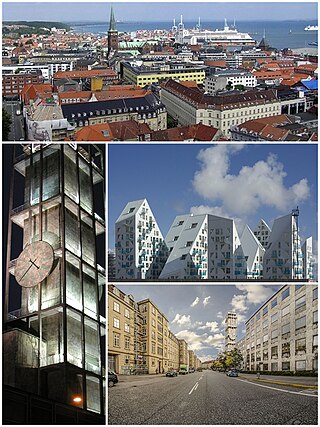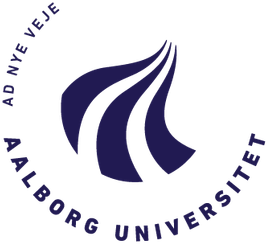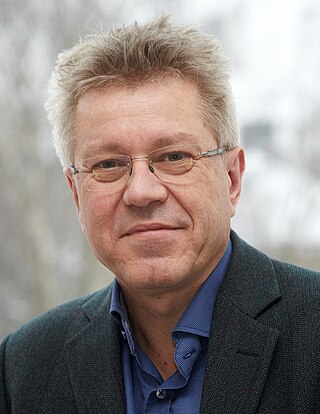
Aarhus is the second-largest city in Denmark and the seat of Aarhus Municipality. It is located on the eastern shore of Jutland in the Kattegat sea and approximately 187 kilometres (116 mi) northwest of Copenhagen.
Higher education in Denmark is offered by a range of universities, university colleges, business academies and specialised institutions. The national higher education system is in accordance with the Bologna Process, with bachelor's degrees, master's degrees and doctoral degrees. The majority of higher education institutions are the responsibility of the Ministry of Higher Education and Science; however, some higher education institutions within the arts are the responsibility of the Ministry of Culture.

Aalborg University (AAU) is an international public university with campuses in Aalborg, Esbjerg, and Copenhagen, Denmark. Founded in 1974, the university awards bachelor's degrees, master's degrees, and PhD degrees in a wide variety of subjects within humanities, social sciences, information technology, design, engineering, exact sciences, and medicine.

Mary is Queen of Denmark as the wife of King Frederik X.

H. Lundbeck A/S is a Danish international pharmaceutical company engaged in the research, development, manufacturing, marketing and sale of pharmaceuticals across the world. The company’s products are targeted at brain diseases, including depression, schizophrenia, Alzheimer's disease, Parkinson's disease and migraine.

Aalborgtårnet is a 54.9 metre tall observation tower built of lattice steel in Aalborg, Denmark. The tower is built on a hill, providing a total height of 105 metres above sea level. The tower has a restaurant on the top. The tower was completed in 1933, and underwent a major reconstruction from February 2005 to March 2005, in which the whole tower was pulled down and later reerected.

Aalborg or Ålborg is Denmark's fourth largest urban settlement with a population of 119,862 in the town proper and an urban population of 143,598. As of 1 July 2022, the Municipality of Aalborg had a population of 221,082, making it the third most populous in the country after the municipalities of Copenhagen (capital) and Aarhus. Eurostat and OECD have used a definition for the metropolitan area of Aalborg, which includes all municipalities in the province of North Jutland, with a total population of 594,323 as of 1 July 2022.
The Villum Foundation ; formerly Villum Kann Rasmussen Foundation was set up in 1971 by civil engineer Villum Kann Rasmussen (1909–1993). 10 years later, he set up the Velux Foundation. Rasmussen was the founder of VELUX and Velfac, Danish window companies. Both foundations are part of VKR Holding A/S, owned by the Rasmussen family and the Villum Foundation, which is the main shareholder.
Erik Reitzel was a Danish civil engineer who started work in 1964 and was for many years a professor at the Royal Danish Academy of Fine Arts and at the Technical University of Denmark, in the disciplines of bearing structures and structural design.

Jens Kehlet Nørskov is the Villum Kann Rasmussen professor at the Technical University of Denmark. He is a Danish physicist most notable for his work on theoretical description of surfaces, catalysis, materials, nanostructures, and biomolecules.

Jens Nielsen is the CEO of BioInnovation Institute, Copenhagen, Denmark, and professor of systems biology at Chalmers University of Technology, Gothenburg, Sweden. He is also an adjunct professor at the Technical University of Denmark. Nielsen is the most cited researcher in the field of metabolic engineering, and he is the founding president of the International Metabolic Engineering Society. He has additionally founded several biotech companies.
Gitte Moos Knudsen is a Danish translational neurobiologist and clinical neurologist, and Clinical Professor and Chief Physician at the Department of Clinical Medicine, Neurology, Psychiatry and Sensory Sciences, at Copenhagen University Hospital. She graduated from Lyngby Statsskole, just north of Copenhagen, before gaining entrance to medicine, where she received her MD from University of Copenhagen in 1984, and became a Board certified user of radioisotopes in 1986. She sat the FMGEMS exam (US) in 1989. She became Board certified in neurology in 1994 and received her DMSc (Dr.Med.) from University of Copenhagen in 1994. She currently resides in Copenhagen, and is married to Tore Vulpius. She has 3 children.

C.W. Obel is a former Danish tobacco manufacturing company which now serves as an investment company fully owned by the foundation Det Obelske Familiefond. Its activities comprise real estate and private equity investments as well as partial ownership of Scandinavian Tobacco Company, Tivoli A/S and Fritz Hansen through Skandinavisk Holding A/S.

The Novo Nordisk Foundation is an international enterprise foundation focusing on medical treatment and research.
Remus Teodorescu (02.06.1965) is a professor of Energy Technology at Aalborg University. He holds a degree from 1989 in electrical engineering from the Politehnica University of Bucharest in Romania. In 1994 he received a Ph.D. degree in power electronics from the University of Galati in Romania.

Mads Græsbøll Christensen is a Danish Professor in Audio Processing at Department of Architecture, Design & Media Technology, Aalborg University, where he is also head and founder of the Audio Analysis Lab which conducts research in audio and acoustic signal processing. Before that he worked at the Department of Electronic Systems at Aalborg University and has held visiting positions at Philips Research Labs, ENST, UCSB, and Columbia University. He has published extensively on these topics in books, scientific journals and conference proceedings, and he has given tutorials and keynote talks at major international scientific conferences.

Ole Kiehn is a Danish-Swedish neuroscientist. He is Professor of Integrative Neuroscience at the Department of Neuroscience, University of Copenhagen, Denmark, and professor of neurophysiology at Karolinska Institute, Sweden.
Christian S. Jensen is a Danish computer scientist who is a professor at Aalborg University.
Elisabeth Engberg-Pedersen is a Danish linguist and professor of applied linguistics at the University of Copenhagen. She has contributed significantly to the description of Danish Sign Language and was the only sign language linguist in Denmark from 1978 to 2004. She is considered an important figure in the development of Danish functional linguistics, and has also studied autism and the relation between language and cognition from a cognitive-functional perspective with focus on semantics and pragmatics. She is the sister of Troels Engberg-Pedersen.

Kim Guldstrand Larsen R is a Danish scientist and professor of computer science at Aalborg University, Denmark. His field of research includes modeling, validation and verification, performance analysis, and synthesing of real-time, embedded, and cyber-physical systems utilizing and contributing to concurrency theory and model checking. Within this domain, he has been instrumental in the invention and continuous development of one of the most widely used verification tools, and has received several awards and honors for his work.













